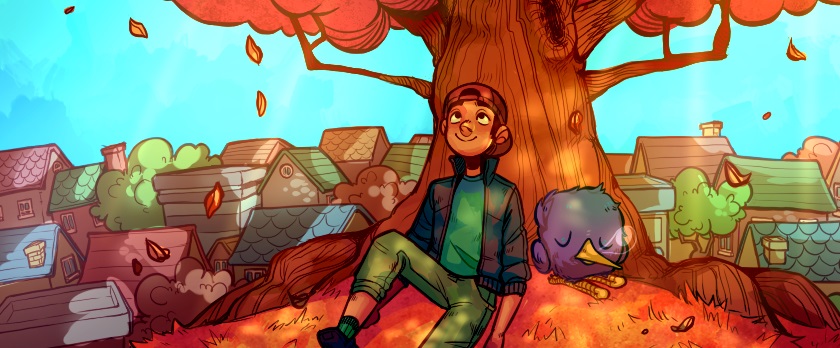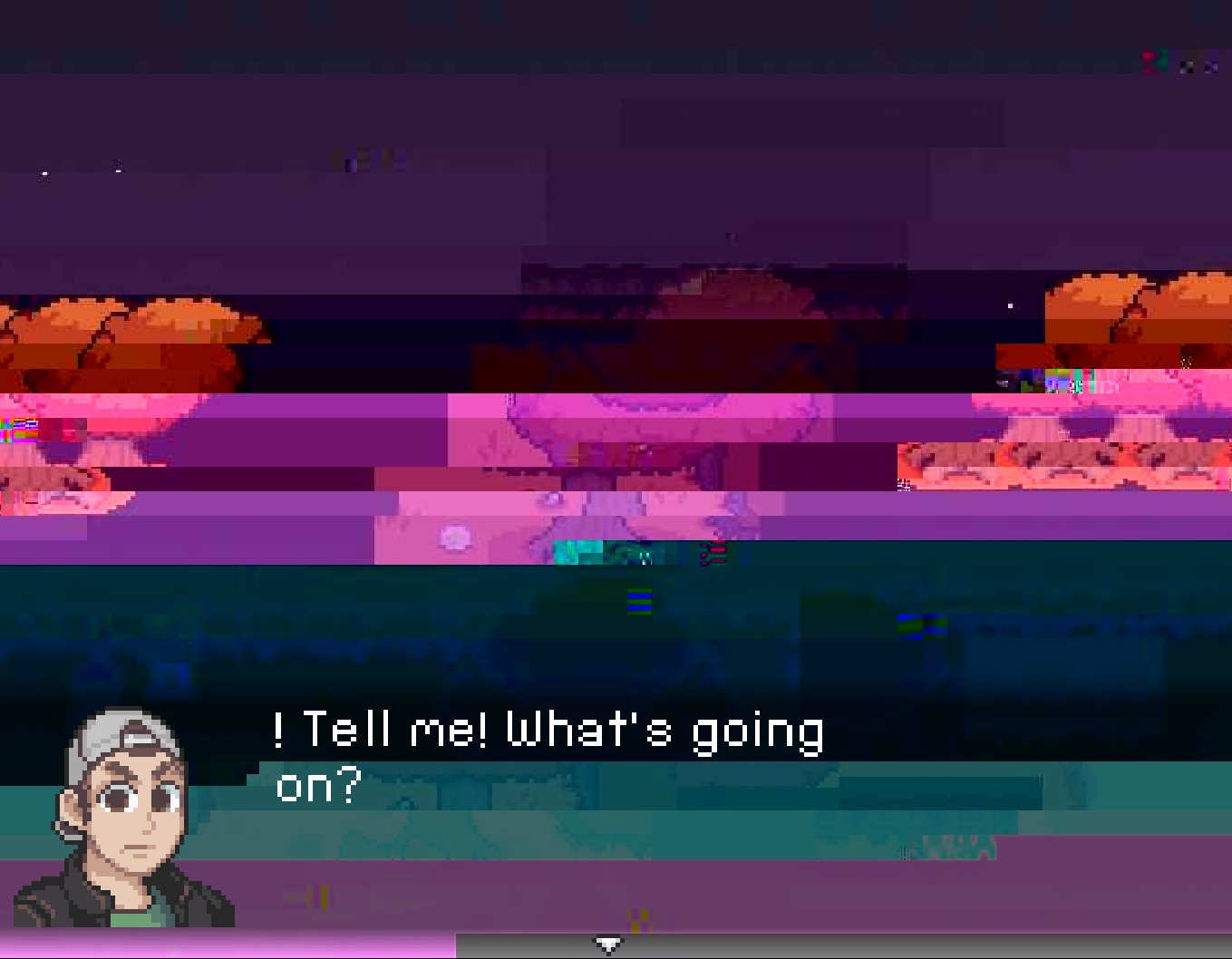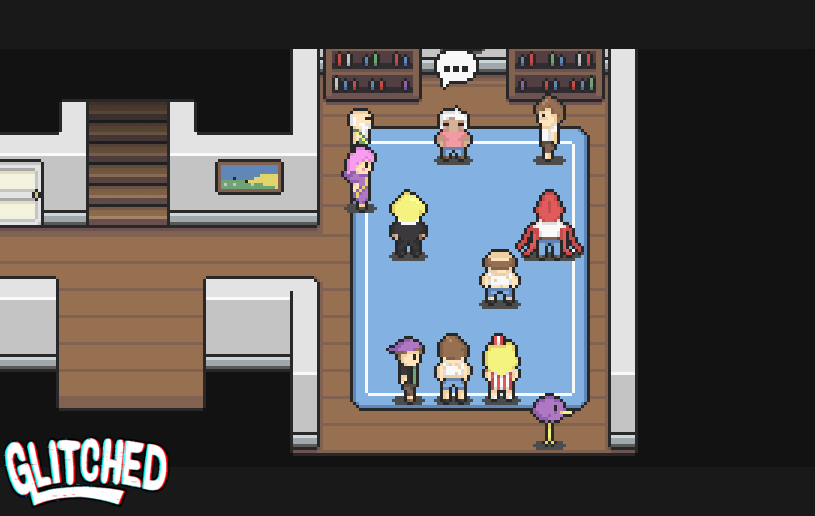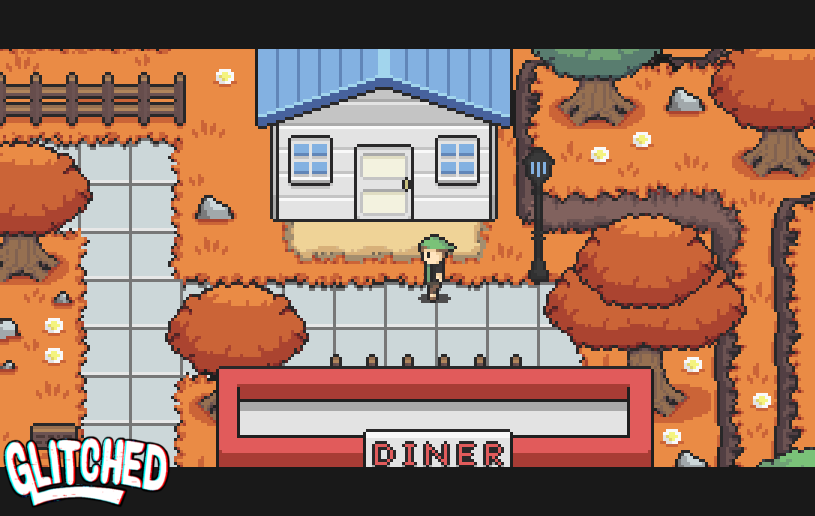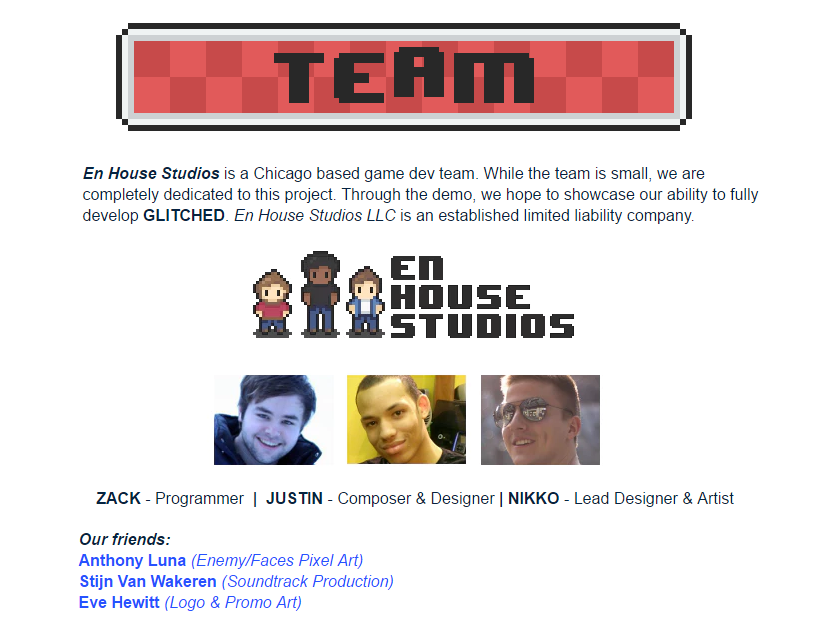I’ve been on a GLITCHED binge, even though it’s just a demo. I’m already a fan, absolutely rabid about the game. I haven’t figured out everything about it yet, but enough that, well, you’ll be seeing a few articles about it in the coming days. As I’m a fan with media connections, I’ve been lucky enough to abuse my powers for the greater good, and recently chatted with lead designer and artist Nikko Koruna about the game’s influences, design, and even how to mentally prepare for the game’s (estimated) February 2018 release.
Cliqist: I went into GLITCHED not knowing anything and was just blown away. Even though they lead to game overs, I did a lot of “bad things” to see how the game would react to me. It’s fun, but in some ways, Gus feels like a lemming on a set path that leads to his doom unless the player intervenes. Was there ever a discussion of creating a way for him to possibly/randomly succeed at certain events without the player’s help?
Nikko: Our thoughts were that we had to teach the player early on that Gus is not your typical hero. When faced with the unknown doom of the glitch, he’s pretty much helpless without your help. A typical RPG might not have needed guidance to figure things out, but Gus is much more an everyman in that sense. A world shattering event for him is just that- world shattering. We are all for punishing the player, but there is a point where it might become unfair. Gus will wise up as the journey goes on- he might even get too wise for his own good.
Cliqist: Why do an existential-themed RPG?
Nikko: This actually came about in a pretty funny way. The origins of GLITCHED go back to when I was in high school. I was in a basic computer programming class and was messing around learning how to code. One of the programs I made was a really crude pixel character. If you pressed certain keys, he would respond to you by calling you names or complaining. I started to think about this character and the world he was in. How would this character feel about me (or the player) controlling their every move?
Funny enough I took a literature class shortly after and we spent a few months on existential writings. It wasn’t long before my high school brain put the two together. The ideas were still pretty blurry. When I met the other devs at university, the really helped to form the world and helped to flesh out a lot of the deeper existential themes which would shape the game.
Kafka and Dostoevsky were both starting points for me.
– Nikko Koruna
Cliqist: Aside from Sartre (who has a game location named after him), which existentialists influenced you guys the most?
Nikko: Eugene Ionesco is a big one for me. I like absurdism a lot as well. Exit the King is one of my favorites by him. Of course, Kafka and Dostoevsky were both starting points for me. The Flies which is a piece by Sartre was the first thing I read in school that actually grabbed my attention and got me thinking.
Cliqist: Other than Undertale, have you played any other Earthbound inspired games? If so, how did they affect the creation of GLITCHED?
Nikko: Lisa is a really great game that I did a lot of learning from while playing. It’s a bit of a cult classic on Steam, but it will really take you by surprise. During the early versions of GLITCHED, I took a lot from the art style but even thought that has been reworked and changed completely the way Lisa told its story and the writing style definitely made an impact on GLITCHED. The game did a really great job with the desolate tone of the world and there is something just so unsettling about playing- I really recommend it.
Cliqist: What was your inspiration for the Essence system?
Nikko: I really liked games with morality systems. Fable 2 was one of the first games I played with this mechanic and I remember being completely absorbed. I played through it a couple times just to see what my character would be like if I decided a different path.
The Essence system actually started by us wanting to do a branching story, but not using the typical good/neutral/evil system. Instead we wanted to focus on motivation behind decisions. Why does a player do what they do? At first, I called it the trait system. There would have been several traits that were opposite of each other and a player would fall somewhere on the spectrum. For example, industrial versus tranquil. After running the system by [co-designer] Justin [Hilton], we eventually decided to create larger personality types. Eventually we arrived at the Essence system you see in the game now.
I love hiding things and having long, complex quests to figure things out.
– Nikko Koruna
Cliqist: Why cut experience points and random encounters from an RPG?
Nikko: For GLITCHED, it simply did not feel right. I am actually a big fan of JRPGs and those are pretty big on grinding and combat. We knew our game was not going to be combat focused and therefore decided against that kind of progression to focus on ensuring other parts of the game would be better.
Random encounters to us seemed like useless padding. Nobody cares or remembers killing slime 265, so could we cut it out completely? Our answer was yes. It gives a different kind of feel to each fight. We wanted players to feel like they were responsible for ending up in a brawl. It puts a weight into each battle when there is a story implication behind your actions.
Cliqist: Why mask how certain choices affect core gameplay options, like your chosen instrument affecting your class?
Nikko: I was actually talking to Justin about this yesterday. Personally, I think it is part of the fun. Your entire move set for the game based on what seems like an arbitrary question at the time? Let’s do it. I like weird things like that. You’ll definitely be hit with more things like it. I love hiding things and having long, complex quests to figure things out. If you’re familiar with the Legend of Zelda: Majora’s Mask then quests styled after Anju & Kafei’s quest will be all over the place in GLITCHED. Tiny nooks in the world holding giant secrets- it’s all real fun.
Cliqist: The demo you released was really meaty. I could finish it in under an hour if I rushed, but taking my time took hours. How much of the game have we seen?
Nikko: We can’t give exact numbers right now, but we are estimating roughly 20-30 hours per play through. 40 hours if you are someone who likes to explore and read everything. Of course there would be much more content that is locked off based on choices; replayability will be big. There was also some content we had to hold off on or cut from the demo. A lot of stuff in Covewood was going to be expanded but wasn’t due to time. You’ll see that in the full version!
Cliqist: The game really feels like it’s set to give fans a lot to chew on. What fan communities have you guys participated in prior to working on games (or may even be into now)? How has being a fan affected your creative process?
Nikko: I was actually pretty absorbed into the Pokémon Rom Hacking community for a while. I love the series to death and I actually had my first encounter with pixels when I began trying to edit different Pokemon sprites from Fire Red. I worked on a few rom hacks with online friends that never saw the light of day; really was my stepping stone into the game design world. The RPG Maker communities across the web are actually really great as well and I always tried to participate in them. For designers starting out, it is a great option to start getting your hands dirty and there are a lot of community resources that really made it easy.
Cliqist: Your estimated release date is early 2018. Until then, are there any games, movies, or books you’d recommend to your fans to prepare them for GLITCHED?
Nikko: Go watch Mr. Robot. I just finished and it breaks the fourth wall in a really clever way. OFF by Mortis Ghost is a great game that can get you in the RPG mood. It’s one of my favorite games of all time and there is a lot to take in while playing. And I referred to it before, but really go check out Lisa if you haven’t!
Cliqist: Thanks for your time, Nikko, and good luck with GLITCHED‘s development!
